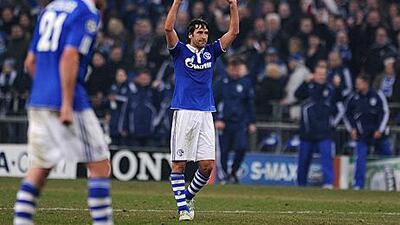Raul Gonzalez, three times a winner of the Champions League, kept being asked, ahead of Schalke 04's semi-final meeting with Manchester United how strange it must feel personally to be back at this penultimate stage of the competition after such a stop-start, apparently crisis-ridden season.
Gently, he tended to respond to his inquisitors that "crisis" always seemed to him an exaggerated description of Schalke's lower points.
Yes, Schalke have sacked a head coach, Felix Magath, already this campaign. Yes, they are in the bottom half of a Bundesliga in which, last May, they had finished second.
But they are only just in the bottom half and have not been in the relegation zone since the 13th weekend of a league calendar which is now 31 match days old.
They lost for only the first time in six outings on Saturday, 1-0 at home to Kaiserslautern, though for that Ralf Rangnick, Magath's successor since last month, had rested some key senior players with tonight's visit of United in mind.
Raul prefers to accentuate the positive. Being in the last four of the Champions League and holding a place in the German Cup final next month is not a bad yield for a season that featured so many changes of staff, mainly an influx of new players, last summer.
Besides, Raul has never sensed a crushing pressure, even when the results in late autumn were beginning to condemn Magath.
"You don't beat Valencia and Inter [Milan], like we did in the last two rounds in the Champions League if you feel under pressure," he told reporters from his native Spain.
And Raul, the man who has participated in more Champions League matches than any other footballer, knows full well that domestic form can be an unreliable guide to what a team might achieve in Europe's elite competition.
Raul would recall that his second gold medal in the competition - during a long career with Real Madrid that ended in last July - was gained with a side described as "ramshackle", one that finished fifth in Spain's Primera Liga that same year, 2000.
Raul used to have to act as an emergency midfielder in that team, something of a compromise for a man with the greatest number of goals in the history of the European Cup. Like Schalke now, Real's only chance that season of appearing in the next year's Champions League was by winning it.
This Schalke are a curious assortment of individuals. But to call them ramshackle would be to demean them too far.
With Raul, who has five goals in Europe so far for the German club, in attack and Germany No 1 Manuel Neuer in goal, the back and front end of the side are of the highest class. In between, there is the imaginative potential of Jefferson Farfan, the Peru winger who returns from suspension and seems to have thrown off his new year bad mood; of the younger midfielders Jose Manuel Jurado and Alexander Baumjohann.
Benedikt Howedes has also impressed in defence through the fairy-tale European run, as has the teenaged Cameroonian Joel Matip, a versatile holding midfielder who has often played in the back four.
Rangnick hopes Howedes will be fit enough to play some part after a muscle problem, though the chances of Klaas-Jan Huntelaar, the former Real and AC Milan striker, partnering Raul are extremely slim. The Dutchman has been out injured since early March.
And then there is Rangnick, easily caricatured by the visiting English media as somehow a suitable figurehead for a team who, inevitably, are underdogs next to the English Premier League leaders United.
The caricature draws on the fact that Rangnick, 52 and in his second spell as coach of Schalke, has a curious history in English football.
During a year spent studying in Sussex in the 1980s, he turned out in the lowly County League for the village of Southwick.
Rangnick was never a distinguished player in Germany, either, but he is alert and enterprising as a tactician and in this, his first European Cup semi-final, he can count on the noisy, fervent backing of Schalke's supporters, who have already seen Inter, the defending champions, eliminated.
They know, as Raul does, that stranger upsets than Schalke knocking out United have taken place in the history of the European Cup.


